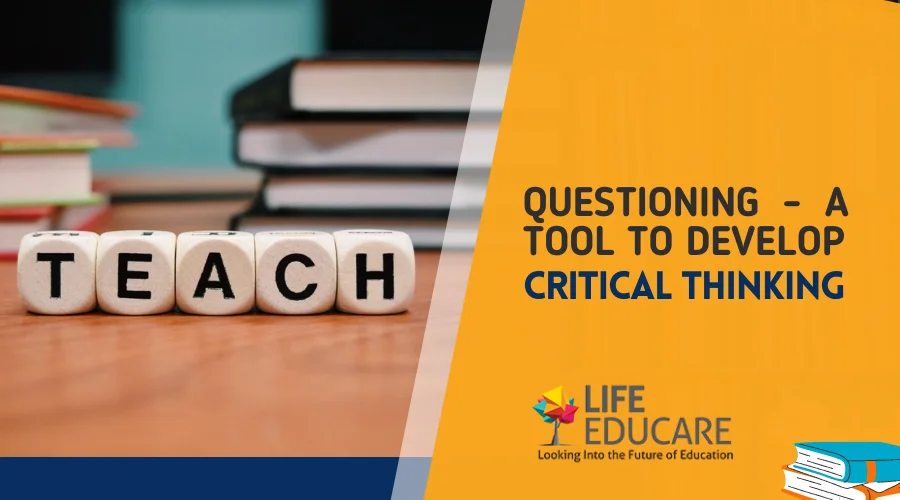
The National Education Policy (2020) focuses on developing students’ problem-solving and critical thinking skills in order to help them become successful. The aim of education should be to create a rational human being – one who can think and be involved in questioning and seeking an understanding of problems and can become problem-solvers for themselves and the world around them. Critical thinking involves applying reasoning and logic to assess situations and arrive at informed perspectives through deep thinking. The key to deep thinking is to ‘delve into’ something by questioning. Questions define the ‘agenda’ of our thinking, define the information we seek, and provide the direction to seek information. Therefore, developing questioning skills is a crucial part of learning from the early years to encourage students to think deeply and critically about the world around them. By asking good questions, students will move from just ‘knowing information’ and reflect on what they think and believe in. Specifically, they will be able to explain with conviction why they believe so.
Teachers have a major role to play in creating an environment that fosters critical thinking through the art of questioning. As a child’s earliest mentors, teachers are best placed to empower students to develop critical thinking skills through various pedagogical approaches in teaching that will have a direct impact on the learning environment. Questioning in the classroom dates to the time of Socrates. The Greek philosopher spent most of his life asking and encouraging his students to ask deliberate and planned questions about their beliefs and values to ensure students could build intellectual views. Effective teaching practitioners continue to use the Socratic approach which involves planned questioning from the lower order of thinking (LOT) to the higher order of thinking (HOT). The skill is in the art of questioning; in knowing how to plan the questions and not using it to negate teaching. It is in ensuring a seamless integration of questioning into teaching to bring a positive difference in the cognitive processes that will push students to ask higher order thinking questions and not just be passive receivers of knowledge.
Currently, there is a lacuna in the way questioning is used in the classrooms. Observations and research have shown that teachers frequently pose questions that are limited to ‘recalling of information’. The questions are not guided by specific aims but are asked with the intention to ‘judge’ the level of retention and they barely trigger thinking. The main reason for this is that teachers are not always clear in their minds as to what constitutes higher order thinking questions and restrict themselves to asking questions at the lower level of the Blooms Taxonomy. Therefore, student answers are merely a regurgitation of what the teacher has provided or straight from a textbook. Another contributor to teachers not asking higher-order thinking questions in the class is the over-emphasis on completing the syllabus and the misconception that asking higher-order questions will require more time for students to think and articulate their answers. Hence, a waste of precious time. Yet another significant truth is that in most cases, teachers do not know how to ask higher-order questions because they are a result of an educational system that did not enable them to ask questions and develop their critical thinking. Consequently, the larger impact of this lack of questioning in the classroom is that students barely ask questions in class, and even when they do, it is at the ‘What, Where’ level and hardly at ‘Why’ or ‘Why not’ level. Additionally, the idea of asking questions in class often holds back the students as they feel they might come across as ‘stupid’ for asking questions. To add to this, students often feel apprehensive as there could be a possibility that they have been reprimanded before for asking questions or simply have the fear of asking ‘wrong question’. It is imperative that we understand that, just as it is important for teachers to ask questions, it is even more important for students to ask higher-order thinking questions or to question the question itself as these develop deep thinking and thus increase conceptual clarity. Furthermore, effective questions from students will give teachers an insight into their thinking, fuel curiosity in the class, and develop peer learning.
To conclude, the art of learning and developing critical thinking is directly dependent on the use of effective questioning in the classroom. Questions can transform learning and strengthen student achievement by developing meta-cognition which can help develop critical thinking. Additionally, questions stimulate students’ interest and can increase motivation for learning. Most importantly, when questioning becomes a part of the learning environment, it empowers students, forces students to think about themselves as learners, creates a sense of responsibility and independence, brings ownership for learning, and fosters collaborative learning. Warren Berger, American author, rightly reminds us of the role of questioning in the classroom when he says, “Knowing answers will help in school. Knowing how to question will help in life.”
If you require any further information/assistance, please feel free to write to us at mary@localhost (Mary Ouseph)
Come and visit our quarters or simply send us an email anytime you want. We are open to all suggestions from our clients.
Ground Floor 1294, ‘Prasanth’ 13 cross, Indiranagar 2 stage, Near Cauvery School, Bangalore, Karnataka, 560038, India
604, 6th floor, Magneto Offizio, Magneto Mall, GE Road, Raipur, Chhattisgarh, India, 492001
Dr. Dhirendra Mishra: +91 96696 94169
Abhiney Singh: +91 70002 40006
Priya Madhyan (HR): +91 62628 88899